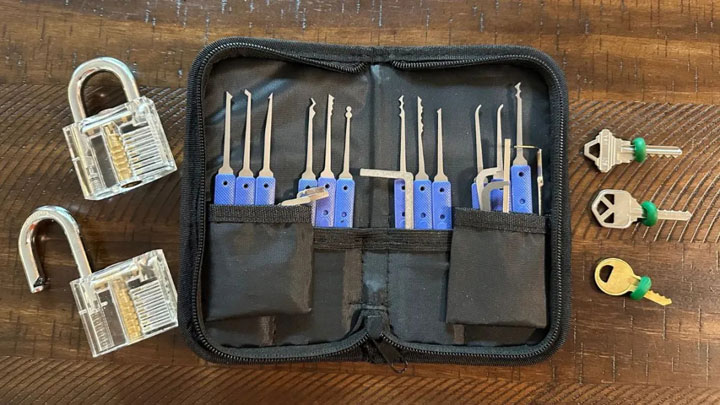Choosing the Right Personal Emergency Lock Picking Kit
2024-11-30 16:25

Lockouts happen when you least expect them—whether it's being locked out of your home, car, or office. When you find yourself in such a situation, waiting for a locksmith or relying on expensive emergency services may not always be the most practical or timely solution. This is where having a personal emergency lock picking kit can prove invaluable. In this article, we will explore how to choose the right tools for your DIY lock picking kit, ensuring you are prepared for those unfortunate lockout moments.
Understanding the Need for an Emergency Lock Picking Kit
A personal emergency lock picking kit is designed to give you the ability to regain access to locked spaces without relying on professional help. It's especially useful in emergency situations, such as when you've lost your keys or when you need to quickly access your property. With the right set of tools, you can bypass basic locking mechanisms on doors, cabinets, and cars.
Before we delve into the specifics, it's important to remember that lock picking should only be used in legal and ethical situations. Lock picking tools should never be used to break into properties without permission. The tools discussed here are intended for situations where you have lawful access—such as when you're locked out of your own house or vehicle.
Essential Tools for Your Personal Emergency Kit
When choosing a lock picking kit for personal use, it's important to focus on tools that are versatile, easy to use, and effective across a wide range of lock types. Here's a breakdown of the most important tools to include:
1. Tension Wrench
The tension wrench is the foundational tool in any lock picking kit. It applies rotational pressure to the lock cylinder, allowing the pins inside the lock to be manipulated. Without this tool, it's impossible to pick a lock effectively. Tension wrenches come in various shapes and sizes, but a standard, medium-sized wrench is usually sufficient for most locks.
2. Hook Picks
Hook picks are essential for lifting individual pins inside the lock. These picks come in different shapes—ranging from short, curved hooks to longer, more pointed ones. For beginners, a medium-sized hook pick is usually a good starting point. Hook picks allow you to carefully manipulate each pin into the correct position, unlocking the mechanism.
3. Rake Picks
Rake picks are designed to "rake" across multiple pins inside the lock. This tool is particularly useful when you're working on simpler locks or when you need to speed up the process. Raking is a technique that involves using the rake pick in a back-and-forth motion to manipulate several pins at once. Although it's less precise than using a hook pick, it can still unlock many types of locks.
4. Diamond Picks
Diamond picks have a shape that allows them to reach deeper parts of the lock, making them particularly useful for high-security locks. They can be used with a more delicate touch to align the pins precisely. Diamond picks are versatile and can be used on a variety of locks, from standard door locks to more complex security systems.
5. Ball Picks
Ball picks are specialized tools designed to help unlock difficult-to-reach pins, often found in older or more complex locks. While they may not be necessary for most basic locks, having a ball pick on hand can be helpful if you encounter tricky locking mechanisms. These picks are often used in automotive or more intricate locks.
6. Shim for Wafer Locks
For locks that use a wafer mechanism (often found in filing cabinets or bicycles), a shim can be an incredibly useful tool. The shim is a thin piece of metal that can be slid between the wafers of a lock to manipulate the locking mechanism. Including a shim in your kit ensures you can handle wafer-based locks in addition to traditional pin-tumbler locks.
Additional Tools for Your Kit
In addition to the basic tools listed above, you might want to consider adding the following items to your personal emergency lock picking kit:
Pick Case: A pick case or pouch is important for organizing your tools and ensuring that they are easily accessible when you need them.
Practice Locks: If you are a beginner, practice locks (which are specially designed to allow beginners to learn the art of lock picking) are an excellent addition to your kit.
Flashlight: Sometimes, especially during nighttime lockouts, a flashlight is essential for seeing what you're doing, particularly if you are working on a lock in a poorly lit area.
Conclusion
A personal emergency lock picking kit can be a highly valuable asset in the event of a lockout. By selecting the right tools—such as tension wrenches, hook picks, rakes, and diamond picks—you can ensure that you're prepared for a wide variety of lock-related challenges. However, always remember to practice responsible and ethical lock picking. Understanding the legal boundaries and using your skills for legitimate purposes will allow you to benefit from your lock picking kit while avoiding potential legal issues.
 Promotion: 5% Discount Code: 5vip
Promotion: 5% Discount Code: 5vip